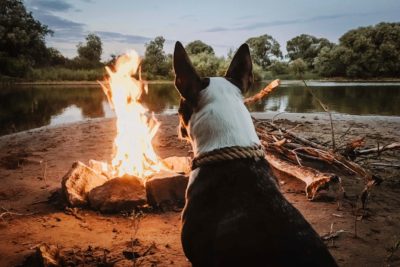National Pet Fire Safety Day And How to Protect Your Pets

National Pet Fire Safety Day And How to Protect Your Pets
July 15th is National Pet Fire Safety Day. While you might think a fire is more of a human problem, think again. According to the National Fire Protection Association, animals are involved in starting fires that lead to 13.7 million dollars in property damage per year. American Humane reports that each year more than 500,000 pets are affected by house fires, with 1,000 house fires started by pets themselves. Pets in proximity to cooking equipment, fireplaces, candles and lamps did their share of the damage. However, not all animals responsible for starting fires were pets: rodents chew wires and birds build nests in chimneys, both causes of house fires. No matter what causes a house fire, pets are at risk of fire and smoke related injury.
Smoke Inhalation Victim Treated at AMC
The veterinarians at the Animal Medical Center recently cared for a dog suffering from smoke inhalation due to a fire in his apartment. When he was found at the scene, he was unconscious, but by the time he reached AMC, the little guy had regained consciousness. This lucky dog avoided skin burns, but tests of his blood indicated increased carbon monoxide as a result of breathing smoke-filled air. Treatment included oxygen therapy in one of our oxygen cages. The ICU staff monitored his eyes carefully since eye injury is common following smoke exposure. Sure enough, several hours after his arrival at AMC, corneal ulcers were diagnosed. Prompt treatment of the ulcers prevented long term eye problems and after a couple of days, he was breathing well on his own and was discharged from AMC.
Not all pets suffering from fire related injury are so lucky – the U.S. Fire Administration doesn’t keep an official statistic, but industry sources estimate 40,000 to 150,000 pets die each year in fires.
Protecting Your Pets Against Fire-Related Injury
The purpose of recognizing National Pet Fire Safety Day is to encourage pet families to take steps to prevent or limit fire-related injuries. So this Monday be sure your home has a pet fire safety sticker readily visible. Many firehouses and insurance companies provide these free of charge. The ASPCA offers them for free if you sign up for their email list. The sticker alerts first responders to the presence of a pet in your home. You should also plan a family fire drill. The plan should include loading your pet into her carrier or leashing him for the evacuation.
Giving Back
If you are looking for an opportunity to donate to a pet fire injury related cause, check with your local fire department and see if they have pet oxygen masks on their fire engines. If not, help them get masks through Project Breathe™.






























